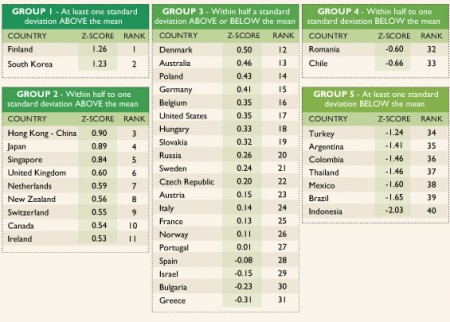
ปลายปี 2555 มีรายงานใน pearson ว่าประเทศไทยอยู่อันดับที่ 37 จาก 40 ประเทศ
โดยประเทศฟินแลนด์อยู่อันดับ 1 ส่วนอันดับสุดท้ายคืออินโดนีเซีย
ซึ่งเป็นผลการจัดอันดับของบริษัทด้านการศึกษาชื่อดังจากสหรัฐฯ “เพียร์สัน”
แล้วมีคำแนะนำสำหรับผู้จัดทำนโยบายด้านการศึกษาระดับประเทศ 5 ข้อ
ผมรู้สึกว่าถ้าเป็นผู้กำหนดนโยบายด้านการศึกษาก็ควรจะอ่านไว้สักหน่อย ถ้าไม่ใช่จะอ่านไว้ .. ก็ไม่เสียหาย
http://thelearningcurve.pearson.com/the-report/executive-summary
5 บทเรียน สำหรับผู้จัดทำนโยบายด้านการศึกษา
Five lessons for education policymakers
1. การพัฒนาการศึกษาไม่ใช่ฝันลม ๆ แล้ง ๆ แล้วจะสำเร็จ ต้องใช้เงินลงทุน เชื่อมโยง และต่อเนื่อง จึงจะได้ผล
1. There are no magic bullets: The small number of correlations found in the study shows the poverty of simplistic solutions. Throwing money at education by itself rarely produces results, and individual changes to education systems, however sensible, rarely do much on their own. Education requires long-term, coherent and focused system-wide attention to achieve improvement.
2. ถ้าได้ครูดี ผลคือนักเรียนดี จึงต้องรักษาครู และพัฒนาให้เป็นครูมืออาชีพ ไม่ใช่มุ่งเพิ่มเทคนิค หรือเพิ่มเครื่องมือ
2. Respect teachers: Good teachers are essential to high-quality education. Finding and retaining them is not necessarily a question of high pay. Instead, teachers need to be treated as the valuable professionals they are, not as technicians in a huge, educational machine.
3. มีวัฒนธรรมเชิงลบบางเรื่องที่ต้องเปลี่ยน แล้วสนับสนุนวัฒนธรรมเชิงบวกที่มีผลต่อการศึกษา
3. Culture can be changed: The cultural assumptions and values surrounding an education system do more to support or undermine it than the system can do on its own. Using the positive elements of this culture and, where necessary, seeking to change the negative ones, are important to promoting successful outcomes.
4. พ่อแม่ต้องเข้าใจและร่วมกันพัฒนาการศึกษาของเด็ก
4. Parents are neither impediments (ผลักดัน) to nor saviours (ผู้ไถ่บาป) of education: Parents want their children to have a good education; pressure from them for change should not be seen as a sign of hostility but as an indication of something possibly amiss in provision. On the other hand, parental input and choice do not constitute a panacea. Education systems should strive to keep parents informed and work with them.
5. การศึกษาคือการเติมเต็มทักษะในปัจจุบัน เพื่อนำไปใช้ในอนาคต
5. Educate for the future, not just the present: Many of today’s job titles, and the skills needed to fill them, simply did not exist 20 years ago. Education systems need to consider what skills today’s students will need in future and teach accordingly.